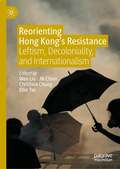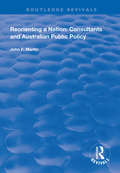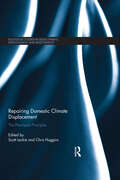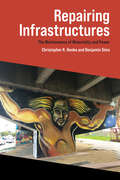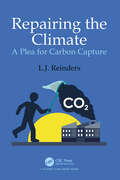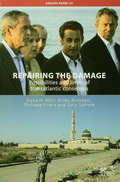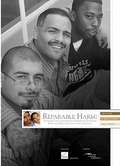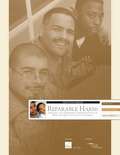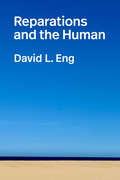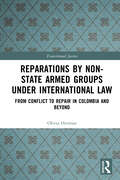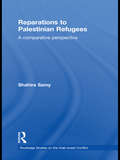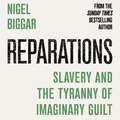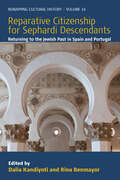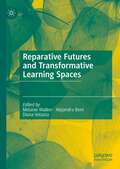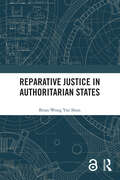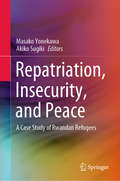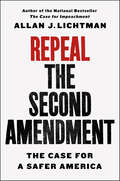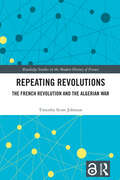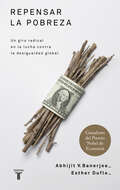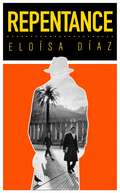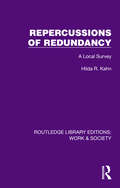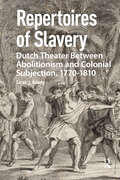- Table View
- List View
Reorienting Hong Kong’s Resistance: Leftism, Decoloniality, and Internationalism
by Wen Liu Jn Chien Christina Chung Ellie TseThis book brings together writing from activists and scholars that examine leftist and decolonial forms of resistance that have emerged from Hong Kong’s contemporary era of protests. Practices such as labor unionism, police abolition, land justice struggles, and other radical expressions of self-governance may not explicitly operate under the banners of leftism and decoloniality. Nevertheless, examining them within these frameworks uncovers historical, transnational, and prefigurative sightlines that can help to contextualize and interpret their impact for Hong Kong’s political future. This collection offers insights not only into Hong Kong's local struggles, but their interconnectedness with global movements as the city remains on the frontlines of international politics.
Reorienting a Nation: Consultants And Australian Public Policy (Routledge Revivals)
by John F. MartinFirst published in 1998, this volume examines how in the 1980s Australian governments experienced dramatic change in the policy-making environment. The use of consultants by successive Hawke Labour governments in the mid-to-late 1980s to facilitate reviews of public policy was a strategy important to dealing with the complexity of these issues. This book shows how the use of policy consultants complements traditional policy-making processes and the management of public policy change by government. In the 1980s Australian governments experienced dramatic and often unprecedented change in policy-making environment. Moves towards market-orientated, 'small' government in a context of worlds economic liberalisation created new and challenging issues for national governments. The use of consultants by successive Hawke Labour governments in the mid-to-late 1980s to facilitate reviews of public policy was a strategy important to dealing with the complexity of these issues. Using insights from a range of public policy literatures, the research investigated the hypothesis that the use of consultants to review important policy areas could be an effective strategy for devising major new directions needed in a context of economic turbulence. In this situation, the book suggests, use of policy consultants complements traditional policy-making processes and the management of public policy change by government.
Reorienting the 19th Century: Global Economy in the Continuing Asian Age (Studies In Comparative Social Science Ser.)
by Andre Gunder Frank Robert A. DenemarkAndre Gunder Frank was a path-breaking scholar in several disciplines over an illustrious and contentious 50-year career. First amongst his many important works is the book ReORIENT: Global Economy in the Asian Age, which sought to correct a Euro-centric world view of the development of the global political economy. Frank passed away in April 2005 while working on this new book, a sequel to ReORIENT. In this book Frank shows many of the myths of European industrialisation, hegemony and capitalism which have hidden the fact that Asia remained a serious power not just into the 18th century, as Frank himself argued in 1998, but well into the 19th century as well. When Frank passed away his colleagues rallied to finish this book and it is presented here as his final major statement.
Repairing Domestic Climate Displacement: The Peninsula Principles (Routledge Studies in Development, Displacement and Resettlement)
by Scott Leckie Chris HugginsClimate change, sometimes thought of as a problem for the future, is already impacting people’s lives around the world: families are losing their homes, lands and livelihoods as a result of sea level rise, increased frequency and intensity of storms, drought and other phenomena. Following several years of preparatory work across the globe, legal scholars, judges, UN officials and climate change experts from 11 countries came together to finalise a new normative framework aiming to strengthen the right of climate-displaced persons, households and communities. This resulted in the approval of the Peninsula Principles on Climate Displacement within States in August 2013. This book provides detailed explanations and interpretations of the Peninsula Principles and includes in-depth discussion of the legal, policy and programmatic efforts needed to uphold the standards and norms embedded in the Principles. The book provides policy-makers with the conceptual understanding necessary to ensure that national-level policies are in place to respond to the climate displacement challenge, as well as a firm sense of the programme-level approaches that can be taken to anticipate, reduce and manage climate displacement. It also provides students and policy advocates with the necessary information to debate and critique responses to climate displacement at different levels. Drawing together key thinkers in the field, this volume will be of great relevance to scholars, lawyers, legal advisors and policy-makers with an interest in climate change, environmental policy, disaster management and human rights law and policy.
Repairing Infrastructures: The Maintenance of Materiality and Power (Infrastructures)
by Christopher R. Henke Benjamin SimsAn investigation of the causes and consequences of the strange, ambivalent, and increasingly central role of infrastructure repair in modern life.Infrastructures--communication, food, transportation, energy, and information--are all around us, and their enduring function and influence depend on the constant work of repair. In this book, Christopher Henke and Benjamin Sims explore the causes and consequences of the strange, ambivalent, and increasingly central role of infrastructure repair in modern life. Henke and Sims offer examples, from local to global, to investigate not only the role of repair in maintaining infrastructures themselves but also the social and political orders that are created and sustained through them.
Repairing the Climate: A Plea for Carbon Capture
by L.J. ReindersClimate change is triggered by a too high concentration of greenhouse gases in the air, carbon dioxide in particular, primarily originating from fossil fuel-burning. Since such burning will not stop any time soon, the concentration will undoubtedly rise further, exacerbating climate change. There is no escape from this. That is where carbon capture comes in: direct air capture (DAC) scrubs the surplus carbon dioxide out of the air for actually lowering this concentration. At the same time emission levels must be drastically lowered by fitting point-source emitters with carbon capture installations. This book sets out the case for such carbon capture, which is a must, without which the climate cannot be repaired.
Repairing the Damage: Possibilities and Limits of Transatlantic Consensus (Adelphi series)
by Dana H. Allin Gilles Andréani Gary Samore Philippe ErreraThe damage that has been done to the transatlantic alliance will not be repaired through grand architectural redesigns or radical new agendas. Instead, the transatlantic partners need to restore their consensus and cooperation on key security challenges with a limited agenda that reflects the essential conservatism of the transatlantic partnership during the Cold War and the 1990s. There will inevitably be big challenges, such as the rise of China, where transatlantic disparities in strategic means and commitments preclude any common alliance undertaking. Yet such limits are nothing new. The absence of a common transatlantic commitment to counter-insurgency in Iraq may cause resentments, but so too did the lack of a common commitment to counter-insurgency in Vietnam. This Adelphi Paper suggests ten propositions for future transatlantic consensus – that is to say, ten security challenges for which the allies should be able to agree on common strategies. These run the gamut from an effective strategy to prevent Iran from developing a nuclear weapons capability to transatlantic leadership for international cooperation against global warming. If pursued with seriousness and a reasonable degree of transatlantic unity, these propositions could constitute the foundations of an effective partnership. They are, in the authors’ view, the basis for a consensus on the most pressing security challenges of the twenty-first century. The time is right for this kind of serious rededication to alliance purposes. There has already been some effort to repair the damage; moreover, new leaders are in place or coming to the countries that were major protagonists of the transatlantic crisis: Germany, France, Britain and, in 2009, the United States. It is possible that these four new leaders will be better able to put the disputes of the recent past behind them. This extended essay is a guide to the possibilities, and also the limits, of a new start.
Repairing the Regime: Preventing the Spread of Weapons of Mass Destruction
by Joseph CirincioneFirst Published in 2000. Routledge is an imprint of Taylor & Francis, an informa company.
Reparable Harm
by Lois M Davis Dana Scultz M. Rebecca KilburnThe Los Angeles area has the most severe traffic congestion in the United States. Trends in many of the underlying causal factors suggest that congestion will continue to worsen in the coming years, absent significant policy intervention. Excessive traffic congestion detracts from quality of life, is economically wasteful and environmentally damaging, and exacerbates social-justice concerns. Finding efficient and equitable strategies for mitigating congestion will therefore serve many social goals. The authors recommend strategies for reducing congestion in Los Angeles County that could be implemented and produce significant improvements within about five years. To manage peak-hour auto travel, raise transportation revenue, improve alternative transportation options, and use existing capacity more efficiently, they recommend 10 primary strategies: improve signal control and timing; restrict curb parking on busy thoroughfares; implement paired one-way streets; promote ride-sharing, telecommuting, and flexible work schedules; develop a high-occupancy toll-lane network; vary curb-parking rates with demand, enforce the current parking cash-out law; promote deep-discount transit passes; expand bus rapid transit and bus-only lanes; and implement a regionally connected bicycle network. In addition, three recommendations may help, depending on the outcome of current events: evaluate arterial incident management, consider cordon congestion tolls, and levy local fuel taxes to raise transit revenue. Given that some of the recommendations may prove controversial, the authors also outline complementary strategies for building political consensus.
Reparable Harm: Executive Summary
by Lois M. Davis M. Rebecca Kilburn Dana SchultzThe summary discusses some of the greatest disparities for boys and men of color relative to their white counterparts across specific socioeconomic, health, safety, and school readiness indicators in California and provides information about different strategies for reducing the disparities--including effective programs, practices, and policies--that can begin making an important difference in changing the life course of boys and men of color.
Reparations and the Human
by David L. EngThe Holocaust and the atomic bombings of Hiroshima and Nagasaki invoked in graphic terms the specter of total human destruction. In response, a new international order of reparations and human rights arose from the ashes of World War II. This legal regime sought to subrogate the sovereignty of the nation-state in order to defend the sovereignty of the human being. While the Holocaust’s history is settled—Nazis were perpetrators and Jews were victims—there remains little historical consensus as to the victims and perpetrators of the atomic bombings. In Reparations and the Human, David L. Eng investigates a history of reparations across the Transpacific. He analyzes how concepts of reparation established during colonial settlement and the European Enlightenment shape contemporary configurations of the human and human rights, determining who can be recognized as victims, who must be seen as perpetrators, and who deserves repair. As demands for reparations now occupy center stage in debates concerning unresolved legacies of dispossession and Transatlantic slavery, Eng considers how the Cold War Transpacific provides a limit case for the politics of repair and definitions of the human.
Reparations by Non-State Armed Groups under International Law: From Conflict to Repair in Colombia and Beyond (ISSN)
by Olivia HermanThis book examines whether and how non-state armed groups might be required to provide reparations for the harm caused by their violations of international law committed during situations of non-international armed conflict.Most of today’s armed conflicts are waged between states and non-state armed groups or between such groups. Societies ravaged by these conflicts endure extensive harm resulting from violations of international humanitarian law and international human rights law. This reality prompts a series of pressing questions. Akin to states, should non-state armed groups be held responsible for making reparation when violating international law? And if so, what measures can these groups take to repair the harm they have caused? The book begins by clarifying if there exists, in contemporary international law, a duty for armed groups to provide reparation. It considers whether non-state armed groups have primary international obligations as distinct duty bearers, and whether reparation can be one of the legal consequences when violating these obligations. Subsequently, the book sheds new light on how non-state armed groups’ duty of reparation can be operationalised in international law. This involves elucidating both the conceptualisation and practical application of this duty. Combining this legal analysis with practical perspectives, the book unveils important insights for international law, drawn from an in-depth analysis of Colombia’s experiences with reparations by armed groups in the context of transitional justice.This book will be of interest to scholars and practitioners working in the fields of international law related to armed conflict, accountability and redress, and transitional justice more broadly.
Reparations to Palestinian Refugees: A Comparative Perspective (Routledge Studies on the Arab-Israeli Conflict)
by Shahira SamyThis book delves into the issue of reparations in relation to Palestinian refugees in their search for a solution to their displacement and dispossession. Highlighting the broad spectrum of reparations available as forms of remedy for a historical injustice, the author probes the reasons behind the failure to reach a reparations agreement till the present day and discusses the significance of issues of apology, recognition and acknowledgement of responsibility. In its approach, the book departs from traditional and modern perceptions of reparations as featuring in international law, history, politics and philosophy. The analysis is focused on a comparative study of two other cases - the German-Jewish reparations agreement of 1952 and the Cypriot conflict - in search of parameters that may constitute a framework to a potential reparations model applicable to the case of Palestinian refugees. When compared to the history of negotiations over reparations in the Israeli-Palestinian case, the findings of the comparison shed light on why reparations are still illusive. The book thus offers an explanation of why reparations to Palestinian refugees have failed, and offers suggestions on how to enhance prospects for reparations to Palestinian displacement and dispossessions. A unique contribution to the study of the Arab-Israeli peace process, this book will be an important reference for scholars of the Arab-Israeli conflict, and for students and scholars of politics, conflict resolution and history.
Reparations: Slavery and the Tyranny of Imaginary Guilt
by Nigel BiggarMany people and countries now claim that the West should pay reparations to its former colonies for the economic damages they say they caused. To what extent is the argument about damage correct in the first place? And, if it is correct, what should we now do about it?Reparations is the sequel to Nigel Biggar's bestselling and widely acclaimed Colonialism. It is as a book of significant importance - not least as a study of the psychology of guilt.
Reparative Citizenship for Sephardi Descendants: Returning to the Jewish Past in Spain and Portugal (Remapping Cultural History #16)
by Dalia Kandiyoti and Rina BenmayorIn 2015, both Portugal and Spain passed laws enabling descendants of Sephardi Jews to obtain citizenship, an historic offer of reconciliation for Jews who were forced to undergo conversions or expelled from Iberia nearly half a millennia ago. Drawing on the memory of the expulsion from Sepharad, the scholarly and personal essays in Reparative Citizenship for Sephardi Descendants analyze the impact of reconciliation laws on descendants and contemporary forms of citizenship.
Reparative Citizenship for Sephardi Descendants: Returning to the Jewish Past in Spain and Portugal (Remapping Cultural History)
by Dalia Kandiyoti and Rina BenmayorIn 2015, both Portugal and Spain passed laws enabling descendants of Sephardi Jews to obtain citizenship, an historic offer of reconciliation for Jews who were forced to undergo conversions or expelled from Iberia nearly half a millennia ago. Drawing on the memory of the expulsion from Sepharad, the scholarly and personal essays in Reparative Citizenship for Sephardi Descendants analyze the impact of reconciliation laws on descendants and contemporary forms of citizenship.
Reparative Futures and Transformative Learning Spaces
by Melanie Walker Alejandra Boni Diana VelascoThis edited book draws on an international cohort of authors, all working towards sustainable, decolonizing human development for more just futures in a variety of learning spaces. Integrating sustainable human development with ‘reparative futures’, the chapters present diverse examples of how transformative learning spaces can be created through different participatory methodologies and with different stakeholders. The book will be of interest to researchers, graduate students, practitioners and policymakers in the areas of higher education, development studies and transformative innovation.
Reparative Justice in Authoritarian States
by Brian Wong Yue ShunWong examines the normative responsibilities of citizens in authoritarian states to address the injustices perpetrated by their governments. He challenges prevailing assumptions in political philosophy, arguing that certain citizens, by virtue of their agency and authorisation of their states, bear responsibilities to compensate, oppose, commemorate, or apologise over injustices that take place in such states.The book explores the relationship between authoritarian regimes and the citizens who enable or endure them, offering a fresh perspective on questions of reparative justice, moral agency, and accountability in contexts where state actors fail to meet their obligations. Drawing upon political philosophy, history, sociology, and international relations, it adopts a richly interdisciplinary approach for understanding citizen liability in authoritarian states. Case studies encompassing historical examples such as the Soviet Union, Indonesia under Suharto, South Korea under Park Chung-hee, through to contemporary cases such as the Iranian, Myanmar, and Russian states, bridge theory and lived experiences, illuminating the complex dynamics of justice in non-democratic contexts. The advancement of a novel General Authorisation View offers original insights that extend beyond authoritarian regimes, addressing broader implications of reparative justice for all regime types.Posing critical questions about the evolving responsibilities of citizens in shaping just societies, this is an indispensable resource for scholars and students of political philosophy, international relations, and empirical political science as well as those interested in authoritarianism, reform in non-democratic contexts, and global justice.
Repatriation, Insecurity, and Peace: A Case Study of Rwandan Refugees
by Masako Yonekawa Akiko SugikiThis book analyzes three major issues related to refugees: repatriation and its accompanying concerns – peace and security. Since the late 1980s, repatriation has been considered the most appropriate solution for refugees. This applies if the home country is peaceful, but often repatriation takes places in conflict situations, which can lead to national and human insecurity problems. Rwanda is one of the countries where the question of repatriation has become highly controversial since the 1990s. The United Nations maintains that Rwanda has changed significantly since the 1994 genocide, and today enjoys an essential level of peace and security. This explains why the UN has promoted repatriation and recommended the cessation of Rwandan refugee status, yet the vast majority of refugees have refused to return to the country. Providing insights from researchers, former UN staff members, journalists, and, most importantly, former Rwandan refugees themselves into both the theory and practice of refugees' repatriation as well as the security and peace issues, this book appeals to postgraduate students, academics, policymakers, and practitioners working for international organizations and NGOs.
Repeal the Second Amendment: The Case for a Safer America
by Allan J. LichtmanA radical case for the repeal of the 2nd Amendment as the only way to control gun violence in AmericaThere's an average of one mass shooting per day in the United States. Given the ineffectiveness of the gun control lobby, it's time for a strategy with spine. In Repeal the Second Amendment, Allan J. Lichtman has written the first book that uses history, legal theory and up-to-the-minute data to make a compelling case for the amendment’s repeal in order to create a clear road to sensible gun control in the US. Repeal the Second Amendment explores both the true history and current interpretation of the Second Amendment to expose the NRA’s blatant historical manipulations and irresponsible fake news releases. Lichtman looks at the history of firearms and gun regulations from colonial times to the present to explain how a historically forgotten sentence in the Constitution has become a flash point of recent politics that benefits only the gun industry, their lobbyists, and the politicians on their payroll. He probes court decisions and the effective lobbying and public relations strategies of the gun lobby as well as the ineffectiveness of the gun control movement for lessons in doing better. What emerges is a clear and cogent plan--repeal and replace the Second Amendment without taking guns away from anyone who has them now--to make the US a safer place. It's time to Repeal the Second Amendment, and Allan Lichtman is the man to bring this radical plan to America.
Repeating Revolutions: The French Revolution and the Algerian War (Routledge Studies in the Modern History of France)
by Timothy Scott JohnsonRepeating Revolutions examines how activists, intellectuals, social scientists, and historians looked to France’s Revolutionary past to negotiate Algeria’s struggle for decolonization from the 1930s to the 1960s.The French Empire justified their claims over Algeria in part through messages of universal progress marked by the political visions tied to the French Revolution. Supporters of Algerian independence confronted those historical claims by identifying the Algerian cause with the French Revolution and by highlighting the apparent contradictions between the history of 1789 and imperial rule. Far-right activists, meanwhile, saw the movement to decolonize Algeria as another manifestation of the revolutionary disorder stemming from the French Revolution. Behind these analogies lay broader changes in the study of North African society and contemporary political relevance of the French Revolution. The focus on analogies to the French Revolution puts different sets of actors in conversation with one another and offers a fresh take on how people’s experiences and expectations changed throughout the Algerian War.This book will appeal to readers interested in the intellectual history of decolonization, the historiography of the French Revolution, the historiography of North African studies, and questions of historical comparison and conceptual change.
Repensar la pobreza: Un giro radical en la lucha contra la desigualdad global
by Abhijit Banerjee Esther DufloEsther Duflo y Abhijit Banerjee, ganadores del Premio Nobel de Economía 2019. El libro que cambiará nuestra manera de pensar sobre la pobreza y lo que debemos hacer para aliviarla. ¿Cómo se vive con menos de un dólar al día? ¿Por qué los microcréditos resultan útiles pero no son el milagro que algunos esperaban? ¿Por qué los pobres dejan pasar las campañas de vacunación gratuita pero pagan por medicinas que a menudo no necesitan? ¿Por qué sus hijos pueden ir a la escuela año tras año y no aprender nada? ¿Por qué no siempre invierten en obtener más calorías, sino calorías que saben mejor? Nuestra tendencia a reducir a los pobres a un conjunto de clichés nos ha impedido hasta ahora comprender los problemas a los que se enfrentan a diario. Dado que poseen tan poco, hemos asumido que no hay nada de interés en su vida económica. Las políticas gubernamentales destinadas a ayudarles muchas veces fracasan porque se fundamentan en suposiciones erradas con respecto a sus circunstancias y su conducta. Repensar la pobreza supone un revolucionario giro en el modo de abordar la lucha global contra la pobreza. Sus autores, dos consagrados economistas del MIT, han acudido directamente a los protagonistas para comprender cómo funciona de verdad la economía de los pobres, cuáles son sus motivaciones y aspiraciones. Los resultados de sus observaciones contradicen muchas de nuestras creencias más arraigadas. El innovador planteamiento de este libro empieza por cambiar las preguntas. A partir de ahí, ofrece las respuestas y, con ellas, un gran potencial transformador y una guía esencial para políticos, activistas y cualquier persona preocupada por construir un mundo sin desigualdad. Reseñas:«Un libro maravillosamente lúcido sobre la naturaleza real de la pobreza.»Amartya Sen, Premio Nobel de Economía «El ensayo más interesante que he leído en mucho tiempo. Está lleno de sorpresas y va a cambiar nuestra manera de pensar sobre la pobreza y lo que se debe hacer para aliviarla.»Moisés Naím en «Lea este libro», El País «Este libro debe ser de lectura obligada para cualquier persona que se preocupe por la pobreza en el mundo. Representa lo mejor que la economía puede ofrecer.»Steven D. Levitt, autor de Freakonomics «Vayamos al grano: es el mejor libro que he leído sobre el tema.No hay truco. El enfoque es directo y honesto. Y algunas de las conclusiones son sorprendentes, incluso desconcertantes.»The Economist «Un logro profundo: reúne lo mejor de la nueva economía y de la antigua. Se han sumergido en el mundo que los rodea, negándose a aceptar la idea de que la economía es unamera extensión de las matemáticas.»David Leonhardt, The New York Times «Maravilloso. Han luchado por conquistar, con honestidad y rigor, un puesto de avanzada hacia la observación, el análisis y la complejidad en un mundo, el de la ayuda, que tiende a preferir los panfletos y las fotografías de famosos. Merecen ser felicitados y leídos.»William Easterly, The Wall Street Journal
Repentance
by Eloísa DíazA FINANCIAL TIMES 'SUMMER BOOKS OF 2021' PICK'An accomplished, inventive detective novel thrumming with tension and family secrets' Sanaë Lemoine, author of The Margot Affair'An astonishingly assured first novel, both funny and moving'The Times Crime Club'Very impressive... Repentance is an evocative crime thriller with a likeable, self-aware protagonist, but also skilfully explores the darkest period in Argentina's modern history'Financial Times'A powerful crime novel ... Opening old historical wounds that still strongly affect Argentinian society, this is a tale with many layers, many of them painful to evoke and a strong depiction of a country and a period that still simmers between the pages of history books and the crime novel is a perfect way of lancing the boil. Recommended'Maxim Jakubowski, Crime Time BUENOS AIRES, 1981.Argentina is in the grip of a brutal military dictatorship.Inspector Joaquín Alzada's work in the Buenos Aires police force exposes him to the many realities of life under a repressive regime: desperate people, terrified people and - worst of all - missing people.Personally, he prefers to stay out of politics, enjoying a simple life with his wife Paula. But when his revolutionary brother Jorge is disappeared, Alzada will stop at nothing to rescue him.TWENTY YEARS LATER...The country is in the midst of yet another devastating economic crisis and riots are building in the streets of Buenos Aires. This time Alzada is determined to keep his head down and wait patiently for his retirement. But when a dead body lands in a skip behind the morgue and a woman from one of the city's wealthiest families goes missing, Alzada is forced to confront his own involvement in one of the darkest periods in Argentinian history - a time ofcollective horror and personal tragedy.Alternating between two key moments in the life of a man and his country, Repentance is a noir with a difference, featuring an unforgettable character on a quest to solve a case that offers both a painful reminder of all he has lost and a last chance at redemption.
Repercussions of Redundancy: A Local Survey (Routledge Library Editions: Work & Society)
by Hilda R. KahnOriginally published in 1964, at a time of much public unease regarding redundancy, this book contains the results of a comprehensive survey, inspired by a suggestion of the then Minister of Labour that the mass redundancies in the Midlands motor industry of 1956 merited a full-scale investigation. The findings are based on an analysis of a 1 in 10 sample of men made redundant in Birmingham in the period. Among the matters examined are the difficulties encountered in obtaining work after redundancy; the range of geographical mobility and the role played by the then employment exchanges in securing new employment. Other chapters focus on the financial hardship caused; the resort to savings and the impact of the redundancies on the gender balance in the workforce. The impact of the dismissals on trade union affiliation is also considered, as are the men’s verdicts on the ‘fairness’ of the selection procedure adopted.
Repertoires of Slavery: Dutch Theater Between Abolitionism and Colonial Subjection, 1770-1810
by Sarah AdamsThrough the lens of a hitherto unstudied repertoire of Dutch abolitionist theatre productions, Repertoires of Slavery prises open the conflicting ideological functions of antislavery discourse within and outside the walls of the theatre and examines the ways in which abolitionist protesters wielded the strife-ridden question of slavery to negotiate the meanings of human rights, subjecthood, and subjection. The book explores how dramatic visions of antislavery provided a site for (re)mediating a white metropolitan—and at times a specifically Dutch—identity. It offers insight into the late-eighteenth- and early-nineteenth-century theatrical modes, tropes, and scenarios of racialised subjection and considers them as materials of the “Dutch cultural archive,” or the Dutch “reservoir” of sentiments, knowledge, fantasies, and beliefs about race and slavery that have shaped the dominant sense of the Dutch self up to the present day.
